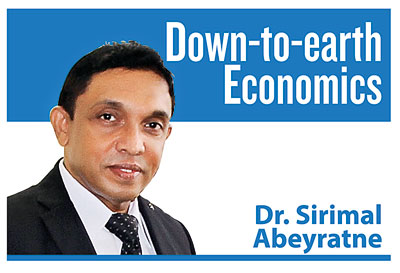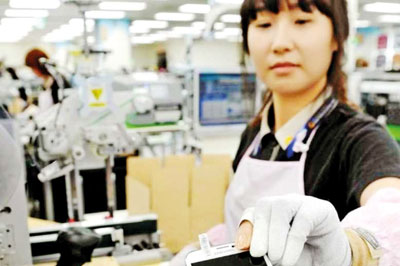Picking winners: Myths and realities
View(s):Quite often we have heard a popular argument from laypersons’ comments to policy references: “The government should support or protect the production of that activity or this activity in order to make the country developed.” Similarly, we have also heard that “when we have so much potential in this area of production, why can’t the government stop imports and encourage domestic production?”
Along the same lines, there are sometimes policy studies towards attempting to identify potential industries to grant policy priority and promote them. Actually, by and large the governments do so! These arguments are quite strong when they are blended with politics, culture, passions and emotions.
I am not trying to argue against the above. Nevertheless, there is something to worry about it: “When the focus is on that, we tend to ignore the fundamentals.” The danger is that we begin to emphasise trivial things anticipating it is the road to prosperity.
In this argument there is a strong policy dimension too. That is why it has misled many people all around the world. In intellectual jargon, it is called the “fallacy of composition” – what is true for a case is fallacious to be true for the whole!
From South Korea
It was a few years back that I met Dr. Jinsoo Yoo, an Economics Professor from South Korea. He visited Sri Lanka (for the first time) on a collaborative research project between South Korea and Sri Lanka. Before arriving here, he communicated with me and asked if he could meet me for a discussion. So one day we met over lunch at the Hilton.
It has always been fascinating to me to learn about South Korea – a country that had in 1960 the same per capita income of US$152 as Sri Lanka had. After the 1970s, South Korea began to attract so much world attention for being one of the four “newly industrialised countries” in Asia; the other three countries were Singapore, Hong Kong and Taiwan.
Forty years later in 2000, South Korea had more than $10,000 per capita income, while Sri Lanka had less than $1,000. Today South Korea’s per capita income is more than $25,000 and, Sri Lanka’s is about $4,000.
Picking winners
Among other things, we discussed about economic matters and issues in both Sri Lanka and South Korea. I never forget a question that I posed to Jinsoo and, the answer he gave me. I asked him: “Is it true that the Korean POSCO company became a global giant in steel manufacturing, because the Korean government chose to set up that company and supported it with special favours?” I wanted to get an answer just from a native South Korean scholar.
Being an economist, he straightaway grasped the meaning of my question and answered: “Samsung from South Korea has also become a global manufacturing giant, perhaps more than even POSCO, but it never received any special favours from the government.”
Before going further, let me explain what this question and the answer is all about. There is a decades-long debate over the role of the government in a country’s export growth and development: The government should intervene selectively to choose the industries or even companies to support and nurture them – the so-called “strategy of picking winners.”
Old wine in new bottles

File picture of the inside of a factory producing Samsung smartphones.
This is a newer version of old protectionism. The idea of old protectionism is that the government should protect domestic industries from competing imports so that there were high levels of import controls. Anyway, this strategy that gained momentum from the 1950s – 1970s in developing countries ultimately appeared to have failed in achieving its twin objectives: the development objective and the foreign exchange objective.
By the 1970s it was clear that most of the developing countries were suffering from slower economic growth, higher unemployment, and worsening foreign exchange shortages. Sri Lanka also plunged into the same agony during 1956-1977.
It was exactly during this time, that just four countries in East Asia – South Korea, Singapore, Hong Kong and Taiwan began to show signs of progressing well with export growth. Having seen their success as well as the failure of most of the others, there were sweeping policy reforms in developing countries; the 1970s and the 1980s were the decades of policy reforms in the world.
One of the explanations to the success of the export-oriented four East Asian countries was the strategy of selecting industries which were set up by either the private sector or the public sector and providing special favours – picking winners. It was argued that these industries would grow and expand under government patronage so that the country would become developed!
The POSCO company which was referred to in my question was one such industry selected by the South Korean government in the late 1960s and nurtured to become a global giant.
No failures at all?
There have been a great deal of attempts to attribute the success of export growth in East and Southeast Asian countries to a strategy of picking winners. If you keep looking for case studies similar to POSCO, there is no doubt you may end up with a long list of cases from many different countries.
The Proton motorcar industry from Malaysia is another famous case study of this type. Among these cases, some companies such as POSCO have indeed grown to be big multinational corporations, while some others such as Proton continued to depend on government favours to-date.
What was troubling me is a different question: Were there only successful cases of “picking winners”? It is quite possible that we do not have information on the cases of failures. In fact, why would anyone report on the cases of failures? If you want to prove something, you might collect successful cases and not the unsuccessful ones!
Perhaps, the number of unsuccessful cases of the strategy of picking winners in East and Southeast Asian countries would have been at least as much as the successful ones, if not more.
Let us assume that there were two companies, say A and B, which received the government’s special favours to do business: Company A became successful, but company B became unsuccessful so that it was closed down. After a while, you forget the case of company B, but pick up company A and proclaim that it was the strategy of “picking winners”!
Understandably, it is foolish to build up a doctrine of development strategy out of a case study. But this is exactly what has happened with the strategy of picking winners – the fallacy of composition!
How does the government know it?
Someone might ask a question like this: How does the government know which industries to pick up?
Most probably and practically, the “government” means a group of people. It might be the vague ideas of either politicians or bureaucrats, or perhaps even academics! How do they know that it is the industry or economic activity that the government should promote so that the country will be developed on a set of promoted economic activities as such?
There was an even bigger problem in the argument for picking winners: How many industries can the government select and nurture?
Apparently it will be a handful because the government should also have resources including adequate tax revenue to support the selected industries. If it is the case, how come the thousands and hundreds of thousands of industries emerge and grow in producing the success of the overall economy?
Evade fallacy of composition
The most fundamental to the development issue is the overall policy environment, and not the strategy of picking winners. The export success of East and Southeast Asian countries, including South Korea, was based more on their overall policy environment attractive to businesses than on selecting a handful of economic activities here and there to be supported by the government.
Even if you wish to grow oranges, farmers might choose apples or pineapples or something else. As long as you have prepared the ground for any of these fruits, what farmers choose doesn’t matter at all. You can also choose oranges unless it affects their choices. Let’s focus more on preparing the ground than the orange plants.
(The writer is a Professor of Economics at the Colombo University)


